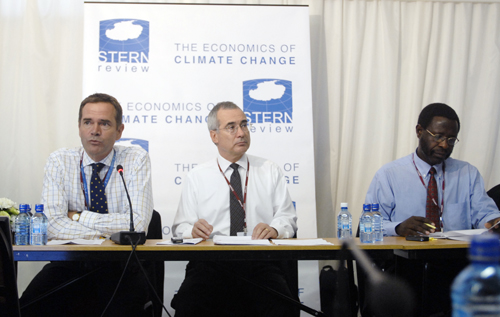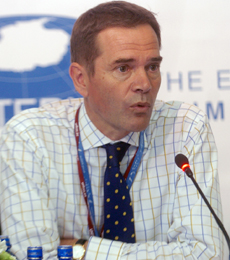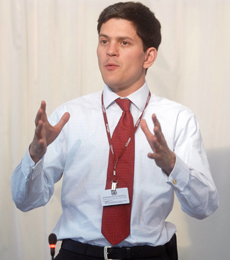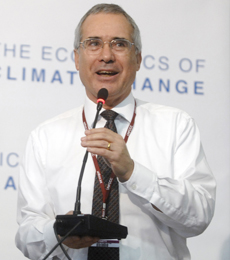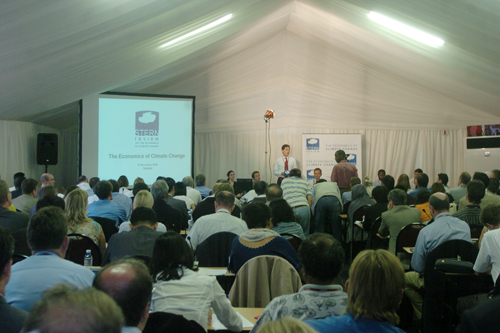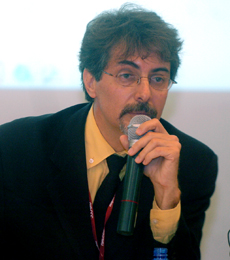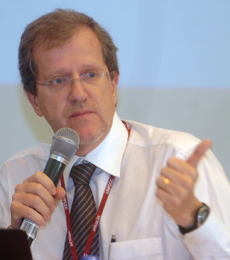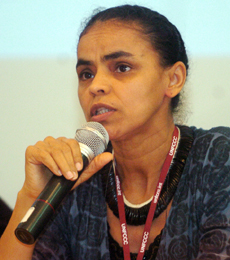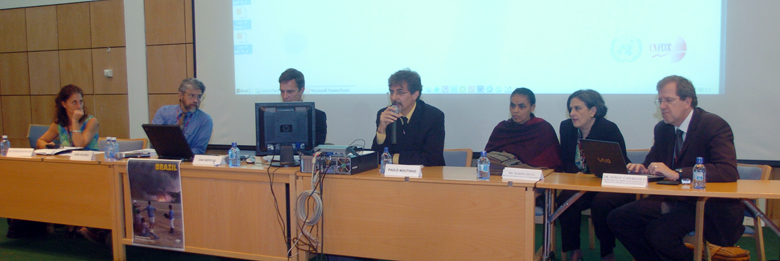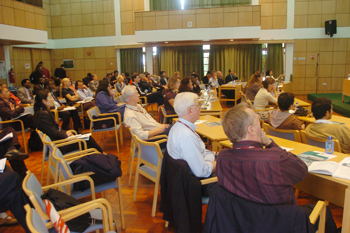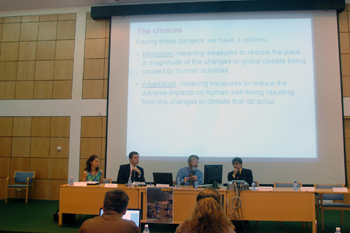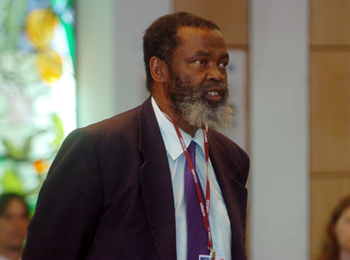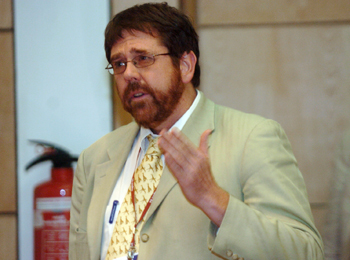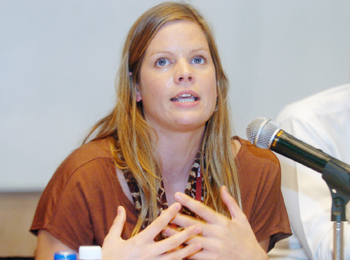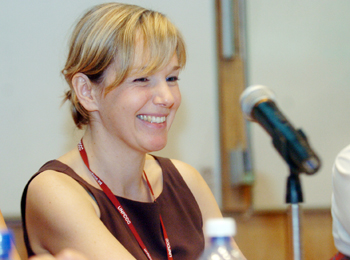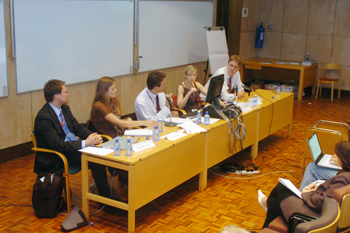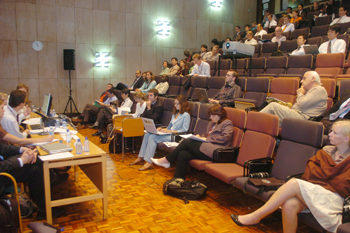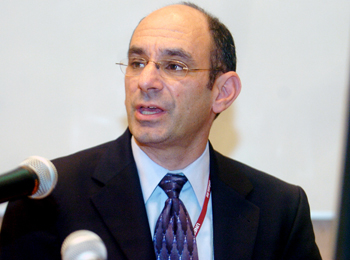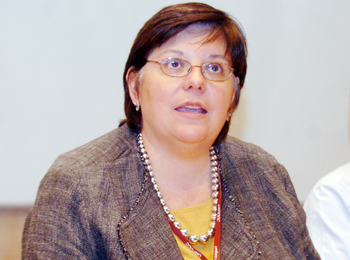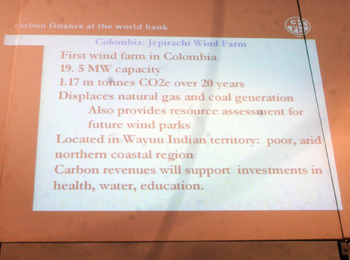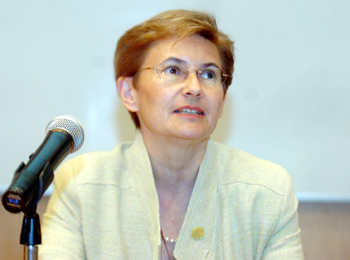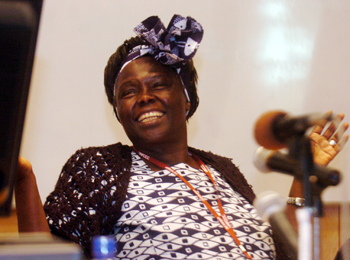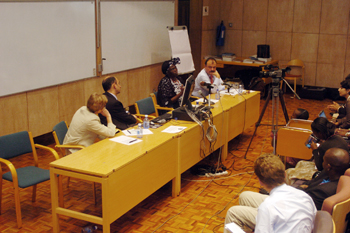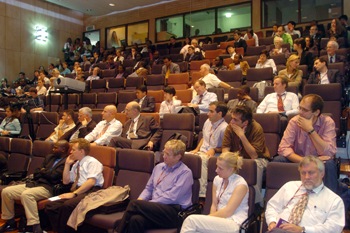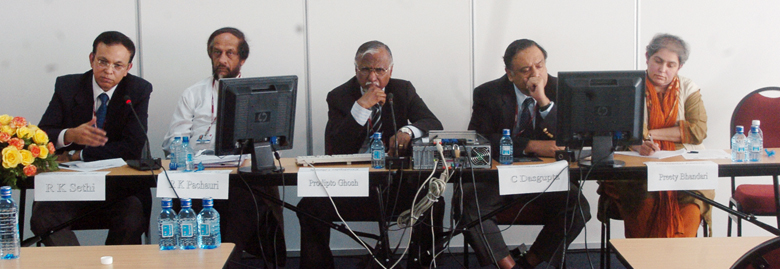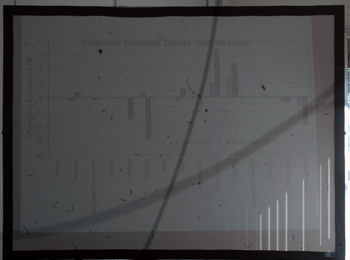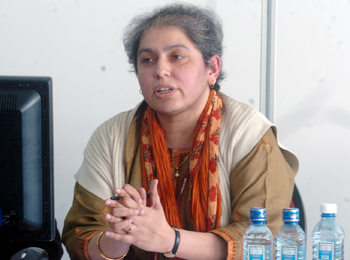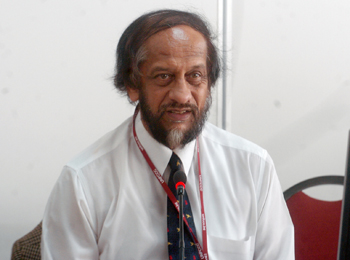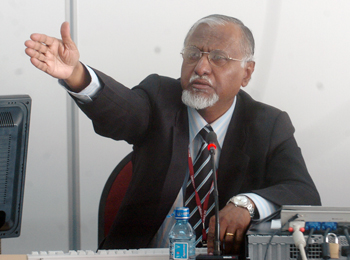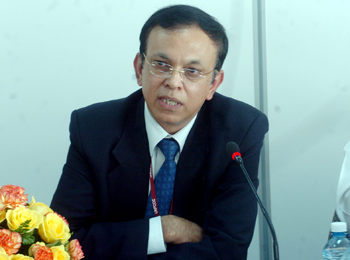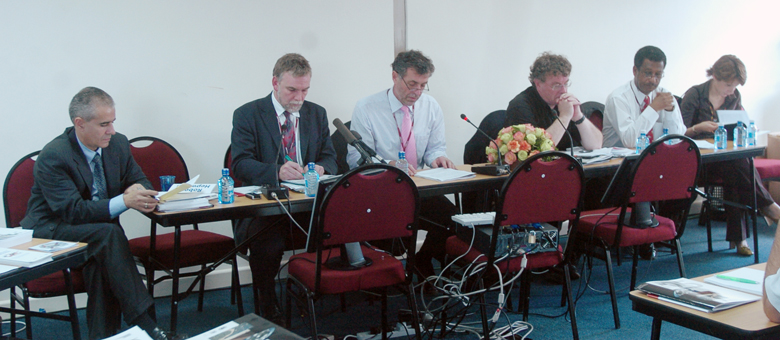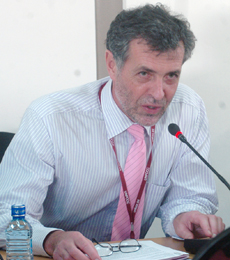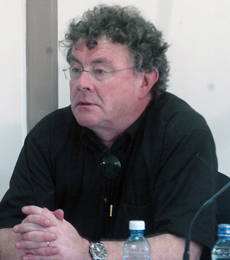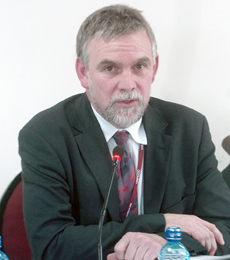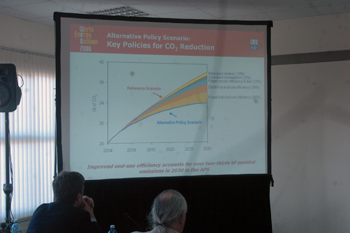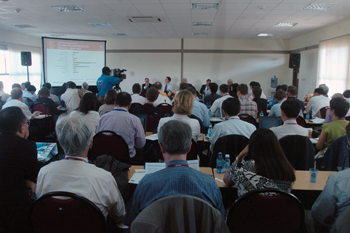 |
||
|
Published by the International Institute for Sustainable Development (IISD)
|
|||
|
A Special Report on Selected Side Events at the Second Conference of the Parties serving as the Meeting of Parties to the Kyoto Protocol (COP/MOP 2) and Twelfth Conference of the Parties (COP 12) to the UN Framework Convention on Climate Change (UNFCCC)
|
|||||
| 6-17 November 2006 | Nairobi, Kenya | |||||
 |
|||
 |
|||
Events convened on Thursday, 16 November 2006
|
Stern Review of the economics of climate change Presented by United Kingdom |
|||
|
David Miliband, Secretary of State for Environment, Food and Rural Affairs, UK, argued that consensus regarding climate change science is “deep and broad,” while the politics are “clear and compelling.” He explained that the Stern Review was commissioned to bridge an information gap regarding the economics of climate change, arguing that the Review establishes a strong economic case for action.
Nicholas Stern, Advisor to the Government, UK, identified climate change as a negative externality and said the Stern Review addresses three questions in this regard: what could be the consequences of the externalities associated with climate change; what is the cost of addressing the externalities; and how can we implement policy that addresses the externalities in the most efficient and equitable way possible. On climate change science, Vicky Pope, Hadley Centre, discussed how uncertainty, including in future emissions, in the models used to predict future climate change and in variability, were addressed in the Stern Review. She said there is a 70% chance of temperatures increasing by 2°C if GHG emissions are stabilized at 450 parts per million carbon dioxide equivalent (ppm CO2e) and a 10% chance of temperatures exceeding 5°C if GHG emissions are stabilized at 550 ppm CO2e. Stern stated that the global community should aim to stabilize GHG emissions in the range of 450-550 ppm CO2e. He explained that that 450 ppm CO2e would be difficult to achieve given the current stock of GHGs in the atmosphere and that the risk of “very harmful impacts” increases significantly at stabilization above 550 ppm CO2e. Jabavu Nkomo, International Development Research Centre, Canada, noted that the “poorest of the poor” in Africa are already affected by climate change. He stressed that increases in global temperature of 2-3°C would be “bad” for Africa, but that increases of 5°C would be “devastating.” On the economics of climate change mitigation, Stern underscored that stabilization of GHG emissions at 500-550 ppm CO2e would cost approximately 1% of global gross domestic product by 2050. He emphasized that energy security, economic growth and climate change need not be in competition. Stern added that effective action requires: long-term emission goals to limit risk; short-term flexibility to limit cost; a broadly comparable global price for carbon; cooperation to bring forward technology; regulation, standards and persuasion; and an equitable distribution of abatement efforts. Stern then addressed the role of the international community with regards to adaptation, arguing that development is the best adaptation strategy because it increases resilience. He concluded by emphasizing the urgent need for strong and decisive international action towards climate change mitigation. In the ensuing discussion, Stern underscored that different countries will undertake different policy actions to address climate change and noted that the Review recommends strong activity in all countries without dictating what that action should be. |
|||
|
|||
|
Measuring and monitoring the reduction of GHG emissions from tropical deforestation Presented by Amazon Institute for Environmental Research |
|||
|
Paul Moutinho, Amazon Institute for Environmental Research, noted the challenge of addressing emissions from deforestation, and suggested that the current Brazilian proposal on reducing deforestation carries forward from the concept of “compensated reduction” discussed at climate COP 9.
Annie Petsonk, Environmental Defense, highlighted the importance of reducing deforestation and emphasized that monitoring deforestation is possible. John Holdren, Woods Hole Research Center (WHRC), highlighted that forest destruction in the tropics is a major source of GHG emissions, noting the role of forest burning in this regard. He outlined that the considerable uncertainties that might exist in monitoring forest emission reductions due to burning can be, and need to be, addressed. Daniel Nepstad, WHRC, suggested the Brazilian initiative demonstrates that emissions from deforestation could be reduced cheaply. He stressed that tropical forests must be a part of the solution to global warming and that cultural and biodiversity survival in preservation efforts must not be left out. Marina Silva, Minister of Environment, Brazil, noted that deforestation has been reduced by 50% in Amazonia due to a recent Brazilian government initiative, and underscored the need for positive incentives for this initiative to go forward. She concluded that if it is hard for countries dependent on fossil fuels to change their developmental model, then it is equally hard for countries dependent on natural resources to change theirs. Participants discussed the possibilities of networking with stakeholders for furthering forest conservation, the role of indigenous people in the Brazilian forest protection effort and the repercussions of keeping forestry out of CDM limits for African countries. |
|||
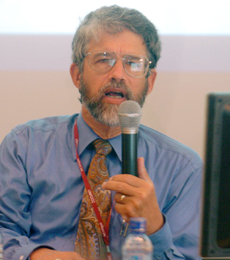 |
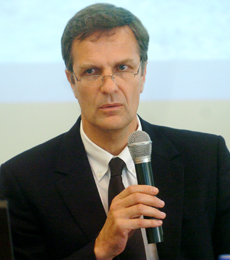 |
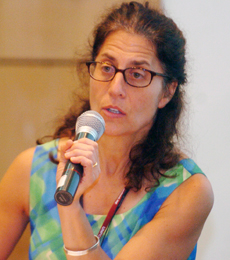 |
|||||
|
John Holdren, WHRC, highlighted that we need to do more mitigation or we will be cooked
|
Daniel Nepstad, WHRC
|
Annie Petsonk, Environmental Defense
|
|||||
|
|||
|
The EU Emissions Trading Scheme: state of play Presented by the EU |
|||||
|
Pierre Schellekens, European Commission (EC), noted that the EU ETS covers only carbon dioxide emissions and highlighted the EC plan to include other GHG emissions in the scheme. Schellekens underscored the private-sector engagement in the EU ETS and the integration of climate change issues into their financial decision-making processes. He noted the feasibility of linking EU ETS with CDM, adding that this would be cheaper than the European allowances and would promote efficiency. Arturo Gonzalo, Spain, said that carbon markets are crucial for Spain to achieve its Kyoto targets. He explained that carbon dioxide emissions for many countries were significantly below the 2005 EU allocation, which led to a range of inequities among member States, had impacts on competitiveness of the private sector and negatively affected market efficiency. Gonzalo suggested the scheme should modify its allocation criteria, be made consistent across the EU and that a link between EU ETS and other carbon markets should be further established. Vichy Pollard, EC, said the EU ETS review aims to improve the scheme for post-2012, by focusing on: expanding GHG and sector coverage; improving predictability and certainty; promoting a further harmonized cap-setting and allocation process; and developing harmonized approach to new entrants in and closures and accreditation and verification of emission reduction projects. Kate Hampton, Climate Change Capital, forecasted that investors may react positively to the EU ETS review and noted that her company’s recommendations for the EU ETS review include the need for: more ambitious reductions to prevent policy failure; avoiding distortions and windfall profits; and ending grandfathering and free allocation of emission reductons. She noted that carbon constraints in Europe have “come to stay” and that the private sector favors knowing in advance what such constraints might be. Matthias Duwe, Climate Action Network Europe, underscored that the EU ETS review should focus on making the scheme fit for a post-2012 world in which GHG emissions will be reduced more deeply. He highlighted the importance for the ETS to internalize the costs of climate change, send price signals to businesses and start transforming the EU economy into a low-carbon one. Duwe argued that the EU ETS has not realized its potential so far, allocation rules are often providing wrong incentives and transparency is insufficient. |
|||||
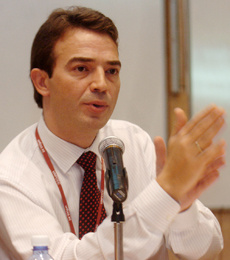 |
 |
 |
|||||
|
Arturo Gonzalo, Spain
|
Matthias Duwe, Climate Action Network Europe
|
Pierre Schellekens, European Commission, said the EC is already looking at the climate policies beyond 2012
|
|||||
|
|||
|
Sustainable development in a carbon constrained world Presented by World Bank |
|||
|
Katherine Sierra, World Bank, gave an overview of the World Bank’s investment framework report “Carbon Finance for Sustainable Development,” stressing the need for building capacity on CDM carbon market opportunities in Africa.
Jöelle Chassard, World Bank, discussed the contribution of carbon finance in setting the international community on a sustainable development path. Citing several carbon finance projects, she highlighted a Nepal biogas programme on renewable fuel for cooking, underscoring the positive impacts of carbon finance on livelihoods. Kenneth Chomitz, World Bank, presented the World Bank’s study on financial incentives for avoided deforestation. Using Madagascar as an example, he lamented how forests are cleared for the "paltry" sum of USD 80, releasing 500 tonnes per hectare of carbon dioxide equivalent, while Europeans are paying USD 7,500 to abate the same amount, terming this a “massive institutional failure.” Chomitz explained that avoided deforestation encourages sustainable agriculture and reduces the pressures that lead to deforestation. Wangari Maathai, Greenbelt Movement, expressed concern that CDM rules make it difficult for some developing countries to attract investments and to derive benefits from avoided deforestation. In the ensuing discussion, participants addressed carbon finance and reasons for disallowing forestry credits in the EU ETS. The World Bank clarified that it is exploring mechanisms to implement pilot "avoided deforestation" projects, calling for a flexible approach to overcome technical difficulties. |
|||
|
|||
|
Harmonising development and climate protection Presented by India |
|||
|
RK Pachauri, the Energy and Resources Institute (TERI), India, noted the importance of CDM in the post-2012 climate regime. He suggested that poverty is made worse by climate change not only in Africa but also in China and India. On the issue of adaptation finance, he said that this is a much needed global public good.
Chandrasekhar Dasgupta, TERI, highlighted that carbon dioxide emissions are on the rise in many Annex I countries and Kyoto targets will not be met even with “additional measures.” He urged that the post-2012 commitments will require inclusion of CDM measures. RK Sethi, India’s Ministry of Environment and Forests, noted that there is a need for a strong signal from Annex I countries for CDM continuation, including a need for deeper emission reduction targets and a longer commitment period. He outlined some options with regards to CDM improvement such as better guidance from CDM Executive Board on programmatic CDM and automatic approval of projects below sectoral baselines. Preety Bhandari, TERI, underscored that India needs more energy for its future development. She emphasized the continuing importance of coal given the Indian energy situation, the stagnating production of domestic energy, and outlined some possibilities for engaging sectoral CDM within power and iron and steel production sectors. Participants discussed the continuation of CDM post-2012 and the increasing parity between the Northern and Indian and Chinese industrial sectors. |
|||
|
|
|||
|
Biodiversity and a changing climate: habitat and species loss Presented by CBD |
|||
|
Jan-Erik Enestam, Finland, emphasized EU’s commitment to mainstreaming climate change considerations in the development cooperation and to achieving the 2010 target of halting biological diversity loss.
Ahmed Djoglaf, Convention on Biological Diversity (CBD), launched the publication “Guidance for promoting synergy among activities addressing biological diversity, desertification, land degradation and climate change,” underscoring the necessity for collaboration among relevant biodiversity MEAs and the UNFCCC. Paola Deda, UN Convention on Migratory Species (CMS) Secretariat, overviewed CMS publication on the impacts of a changing environment on wild animals. She said impacts include: changes in distribution and behavior; changes in length, timing and location of migratory routes; and disturbances and changes in migration routes and feeding locations. Robert Hepworth, CMS Executive Secretary, pointing to conservation priorities, highlighted the importance of maintaining a coherent network of “stopover” sites and of collating the requisite information on such sites. He called for quicker delivery of adaptation measures. On the beneficial impacts of ecotourism, Hepworth observed how wildlife can pay for itself and support communities. Taye Teferi, WWF, Eastern Africa, discussed impacts of extreme climate on wildlife tourism and livestock in the Mara ecosystem in Kenya. Outlining how a recent drought resulted in 28% hippopotamus deaths and an estimated 30% loss wild herbivores in the Mara, he elaborated on the resulting imbalance of wild animal populations and increased tourist complaints relating to low wildlife encounters. Wangari Maathai, Greenbelt Movement, Kenya, cautioned on the dangers of clear-cutting indigenous forests in favor of the monoculture of exotic tree species, reiterating the negative impact of the “shamba” system on biodiversity. She signed a memorandum of understanding between the Greenbelt Movement and the CBD Secretariat to off-set the Secretariat’s carbon footprint through reforestation in Africa. |
|||
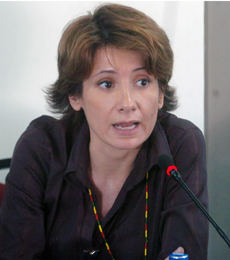 |
 |
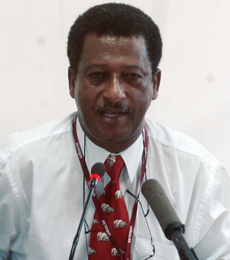 |
|||||
|
Paola Deda, UN Convention on Migratory Species (CMS) Secretariat
|
Ahmed Djoglaf, Convention on Biological Diversity (CBD)
|
Taye Teferi, WWF, Eastern Africa
|
|||||
|
|||
|
||
|
Click the above button to go back to our ENB main coverage
|
||
|
|
|
|
|
||
|
